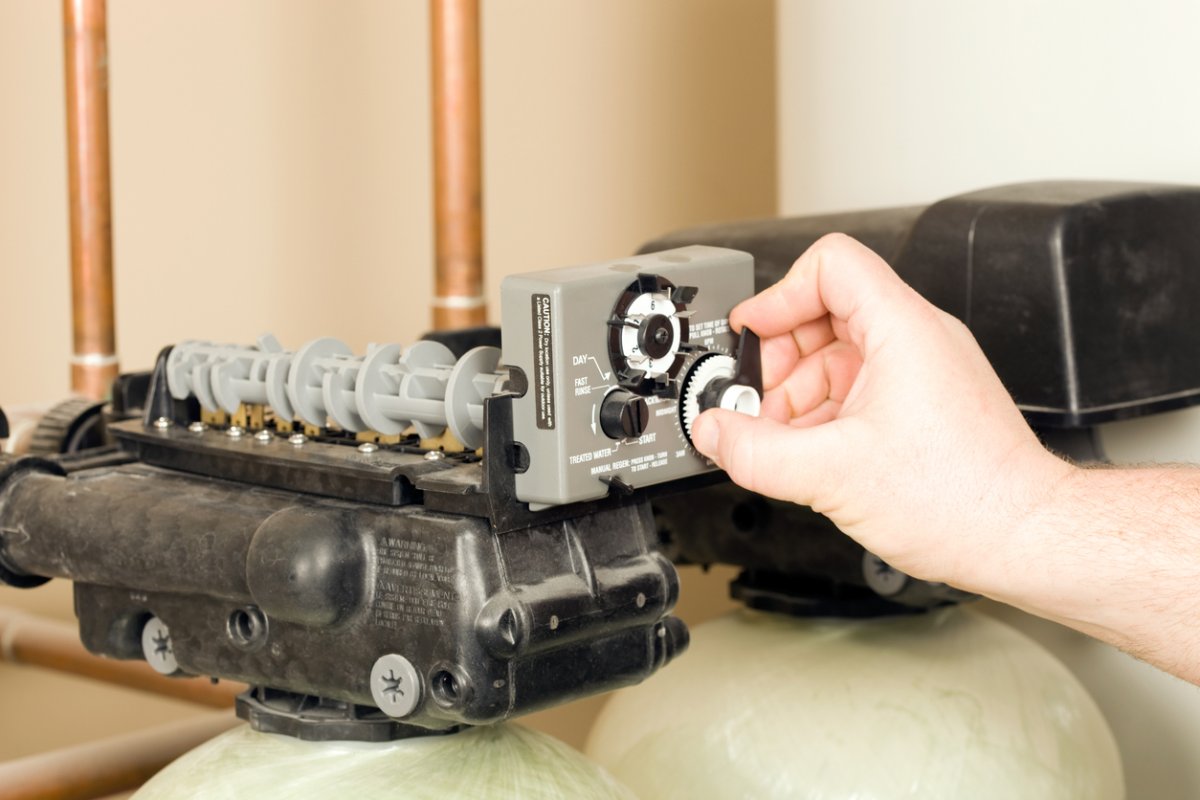

We may earn revenue from the products available on this page and participate in affiliate programs. Learn More ›
Q: Our new home has a whole-house water softener installed. The previous owners only lived here for a few years and aren’t sure exactly how old it is, though they indicated that it was working well. I’ve never had a water softener before, and I know very little about them except that it’s a necessity because we have such hard water here. I know we’ll need to replace it immediately when it stops working, but how long does a water softener last?
A: Congratulations on your new home and on recognizing that assessing the age and condition of major appliances is an important first step in maintaining a home! Water softeners are important in areas with hard water because hard water can affect the efficiency and lifespan of dishwashers and laundry equipment, cause scale problems in pipes and plumbing fixtures, and cause drinking water to taste odd. Even in areas where the water isn’t particularly hard, adding a softener can extend the life of plumbing and machines that use water, and it can also improve the condition of hair and skin.
The average life expectancy of a water softener is 15 to 25 years, but that depends on quite a few things: the quality of the build, the materials used to soften the water, and most importantly, the maintenance. If the previous owners lived in the home for several years and aren’t aware of how old the unit is, it wasn’t brand-new when they moved in, so you can probably guess that it’s at least 5 to 8 years old. However, if there’s no documentation of the maintenance performed on the softener, you’ll want to watch closely for signs that the system is starting to fail rather than relying on an average water softener lifespan.
Water softeners remove heavy minerals from the water using salt and brine, water distillation, reverse osmosis, or magnets.
Homeowners may be wondering, “What is hard water, and why would it need to be softened?” All water has some minerals that have leached into it from the soil and rocks around it. Most of the time, this is a good thing—everyone can use a few extra minerals in their diet! In some cases, however, the concentration of minerals can be too high. Water treatment plants usually filter out minerals or chemicals that can be harmful if ingested, but other minerals, notably magnesium and calcium, aren’t filtered out by treatment plants. Those who use well water may also see high levels of magnesium and calcium. At high levels, these minerals can cause limescale buildup in pipes, which can reduce the water pressure available to the home and damage pipes in the long term. These minerals can also reduce the effectiveness of soaps and cleansers, stain plumbing fixtures, and can damage appliances that use water—along with drying out skin and hair and potentially causing eye irritation. Some signs that a home needs a water softener include stained plumbing fixtures, dry hair and skin, and unclean laundry. Hard water can cause problems with appliances such as dishwashers and washing machines as well.
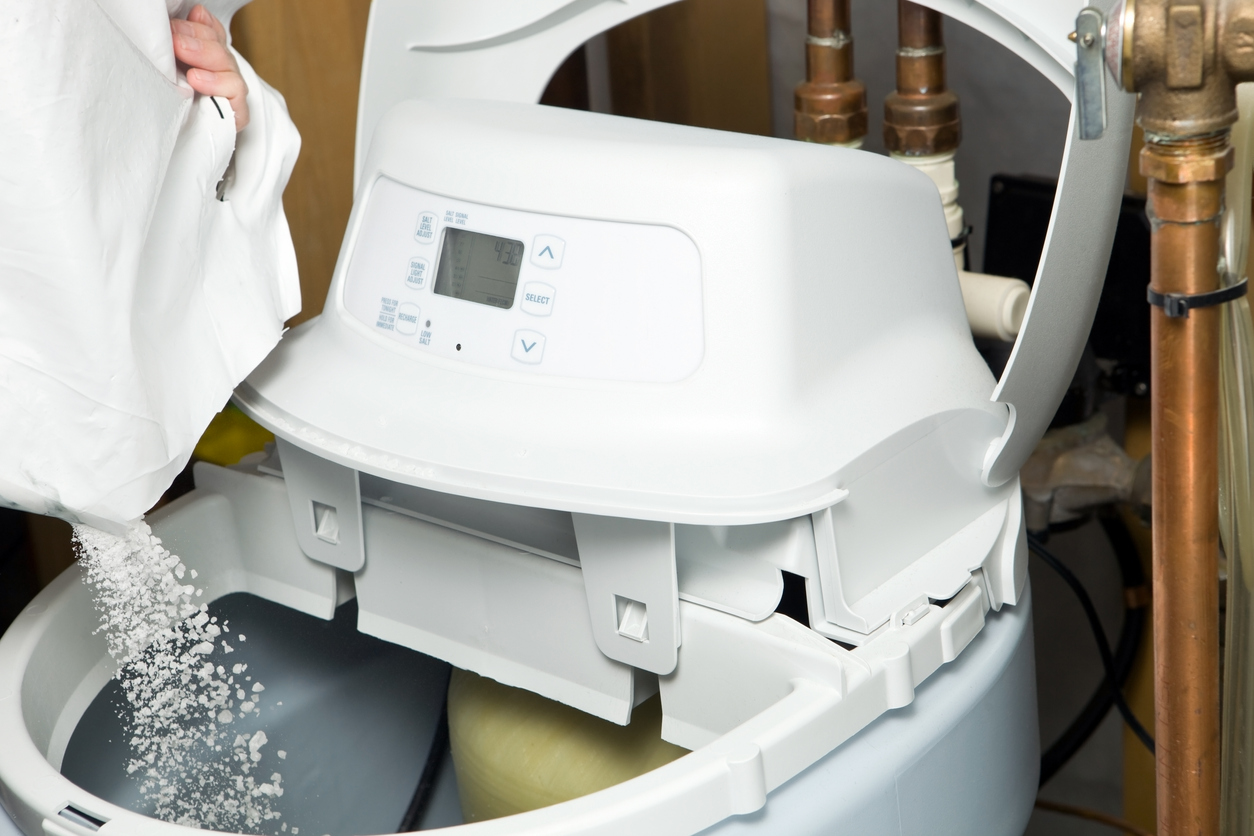
How do water softeners work? There are four main types of water softeners, and each type works slightly differently.
Salt-and-brine systems are mid-priced options that work well in most types of homes and RVs, which is why they’re the most commonly used types. These systems feature a bed of resin that draws the minerals in (or into which the minerals are forced via a brine jet) and causes a reaction resulting in an ion exchange, releasing salt ions in the place of the undesirable minerals. This adds a minimal, nearly undetectable amount of salt into the water, and as a result, the resin periodically needs to be recharged with salt so that there are sodium ions available to exchange for the minerals. Choosing one of the best water softener salts can help this type of softener be more effective and potentially last for longer. Water softeners then work by distilling the water to remove all traces of the minerals. Essentially, the water is boiled, which separates the water molecules from the minerals. The water vapor is separated from the minerals and cooled, and is then free of the substances that can damage plumbing and cause irritation. These units tend to be more costly and take up more space than other units. Reverse osmosis units use pressure to force water through a membrane that allows the water molecules to pass through but prevents the minerals from doing so, resulting in filtered water separated from the damaging minerals. These units will require filter changes and membrane maintenance on a regular basis.
Salt, distillation, and reverse osmosis units all rely on an ion exchange to separate the minerals from the water molecules. A fourth type of water softener, called a magnetic or electric softener, uses a strong magnetic field to draw the ions from the magnesium and calcium, neutralizing their structure and allowing them to dissolve in the water rather than bonding together to create buildup. These systems attach to pipes, take up little space, and don’t require cutting into the pipes, but they do need to be plugged into the home’s electrical system. The best salt-free water softeners may be a good option for homeowners who are forgetful when it comes to maintenance, since they tend to require less than their salt-powered counterparts.
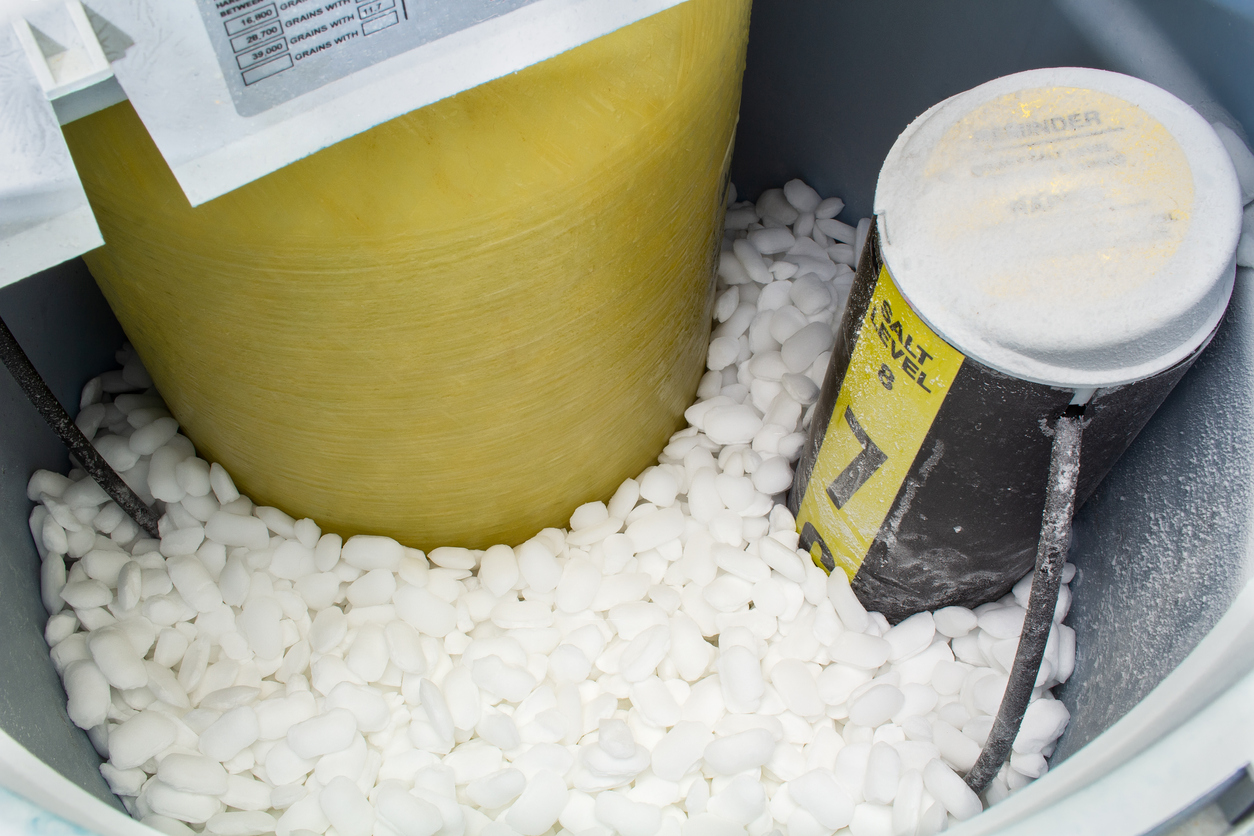
When properly maintained, water softeners can last as long as 15 to 25 years.
Fifteen to 25 years is a reasonable answer to the question “how long should a water softener last?” But “should” is the operative word in that statement; a more reasonable question is “how long do water softeners typically last?” As is the case with most appliances, the lifespan of a water softener will depend largely on maintenance (and, to a certain extent, on how hard the water is and how much water the home uses). Even the best water softener won’t last as long as it could if it’s the homeowner doesn’t keep it well maintained. Regular recharging, filter changes, inspection, and general maintenance, along with repairs when needed, will extend the unit’s lifespan significantly. These aren’t appliances that need daily tending—once or twice a year is usually sufficient—but it’s good for the homeowner to pay attention to the signs that the unit may be failing so that repairs can be made promptly to keep the system running efficiently.
Common signs of issues include chalky-tasting water, non-lathering soap, stiff and scratchy laundry, mineral deposits, and dry skin and hair after showering.
Most people don’t think about their water, or their water softener, unless something is suddenly “off” or different. It’s sensible for homeowners to start noting any changes that occur in the water coming into the home, especially if the water softener is aging or its exact age is unknown. In many cases, laundry that comes out of the dryer scratchy, dingy, or yellowed is one of the first indications that there’s a problem. This could, of course, also be related to problems with the washer or dryer, but hard water prevents soap from lathering effectively, resulting in clothes that aren’t as clean as they should be and particles of undissolved soap remaining in the fabric. Similarly, anyone who uses a water softener will want to take note when hand soap and shampoo suddenly aren’t lathering well—which can also result in dry or scratchy skin and hair, or irritated skin, especially on the face. If a homeowner is seeing small white dots on the faucet, that’s the calcium left behind after a drop of hard water evaporates. And water that tastes chalky (or has any strong flavor) is another indication that there’s a problem in the pipes that is likely caused by a water softener that’s not doing its job well. At the very least, these signs suggest that it’s time for maintenance. If that doesn’t work, it’s likely time for the homeowner to call a professional who knows how to install a water softener to replace the old one.
A water softener with insufficient drainage, a damaged resin bed, or a clogged bypass valve may require repairing.
Changing the filter, recharging the resin bed, and clearing out a salt bridge are all steps a homeowner can take to reset their water softener. Other problems require the help of a professional who can do the necessary repairs. Drainage problems can stem from a number of causes—if the softener hasn’t been working at its full capacity for a while, it’s possible that the motor is damaged and isn’t circulating water properly. This can be a simple fix—the motor is an independent part of the system—but it’s not a DIY fix. Neither is a damaged resin bed: Resin beds can fail much earlier than the rest of the system, especially if the incoming water is heavily chlorinated. Again, the bed can be replaced independently of the whole system by a plumber or technician. Bypass valves allow homeowners to use the hard water coming into the home for large tasks, such as watering the lawn or washing the car, without depleting or overworking the softener. But sometimes the valves can become stuck or clogged, resulting in hard water entering the home. It’s another easy repair for a pro.
Taking care of these kinds of repairs promptly will prevent further damage to the system and maximize the life of the water softener.
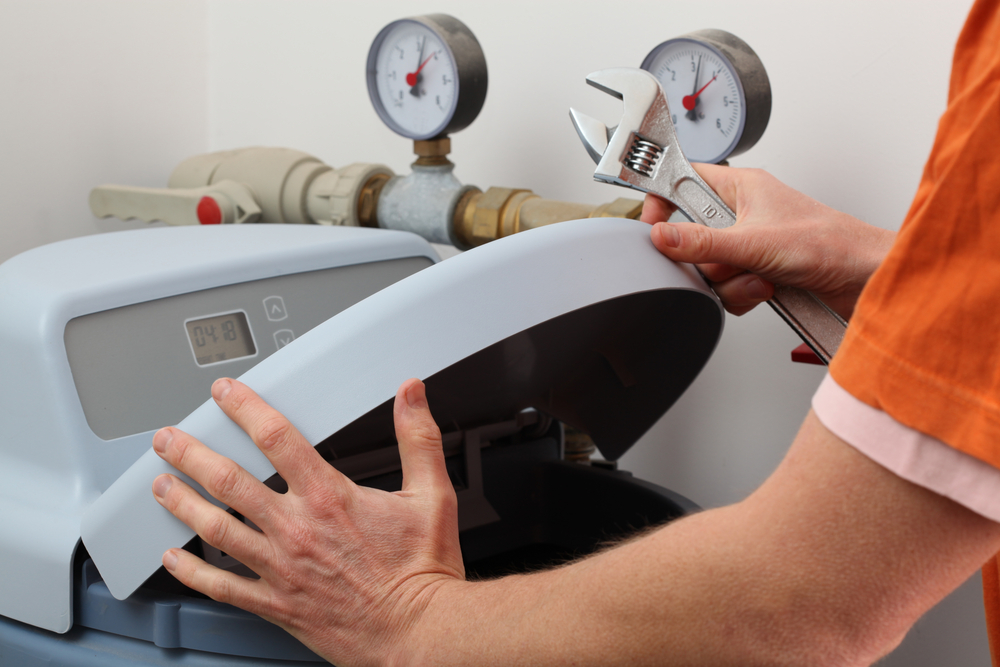
A water softener with electrical problems, that requires regular repairs for the same issue, or is over 10 years old may need to be replaced.
Because the typical lifespan of a water softener unit is 15 to 25 years, any unit that is past its 10th birthday is one to watch closely—especially if it’s already had problems, if the water is especially hard in the area, or if the homeowner is uncertain of the level of maintenance it has received. It may not be worth the expense of repairing a unit over 10 years old if the repair will be costly. As with water heaters—or really any appliance that holds and processes a lot of water—it’s better to be a bit early on a replacement than a bit late, after the unit has failed and potentially flooded the home. In addition, if the unit repeatedly requires repairs of the same problem, or if it has any electrical problems at all, it’s probably time for a replacement.
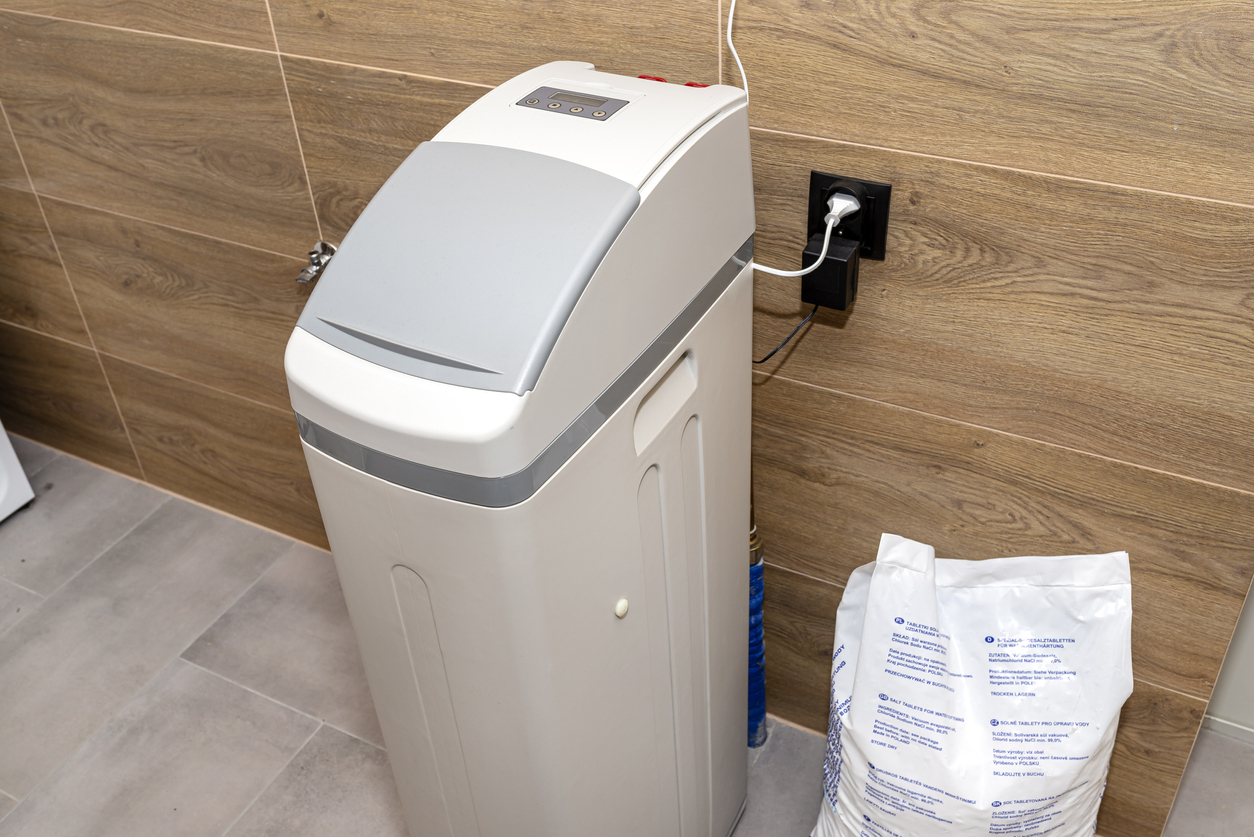
A home warranty can help cover the cost of repairing or replacing a water softener.
Since they are whole-house appliances, water softeners are generally covered under home warranties that include whole-house systems (though homeowners will always want to check the specific policy to be sure). The best way to prolong the life of any appliance is good, consistent maintenance that prevents small problems from turning into big ones. The tricky part with early and prompt maintenance and repairs is the budget: Many homeowners have experienced, at least once, calling a repair person for something they thought would cost about $200 and finding out it would cost $1,000. Getting a policy with one of the best home warranty companies such as American Home Shield or Choice Home Warranty is a great way for homeowners to budget for repairs and replacement of water softeners and other covered appliances.
With a home warranty, the homeowner pays a premium for coverage over a certain period of time, usually a year. In the warranty document, the company lays out precisely which systems and appliances are covered, the maximum payout amounts, and the amount that the homeowner will pay for a service call. When a repair on a covered system or appliance is needed, the homeowner can call for service, pay the predetermined amount, and a technician will take care of the rest. For example, should a homeowner with a water softener covered by a home warranty notice that the laundry is scratchy and the dishes aren’t particularly clean, they can call their home warranty provider and file a claim to get a plumber or technician to the home immediately to investigate the problem, confident that they’ll be charged only the contracted amount for a service call. And if the technician determines that the softener needs to be replaced, the cost for a new water softener system may be covered by the warranty as well. A homeowner without a home warranty might put off the repair, deciding they can deal with the scratchy laundry rather than risk a huge plumber’s bill, and then have to shell out cash for a new water softener later when a small repair would have extended the existing water softener life expectancy.
How long will a water softener last? These units can improve the taste and feel of the water, the efficiency of cleaning appliances, and the water pressure in the pipes for between 15 and 25 years with excellent maintenance. A home warranty can help make that maintenance affordable.
